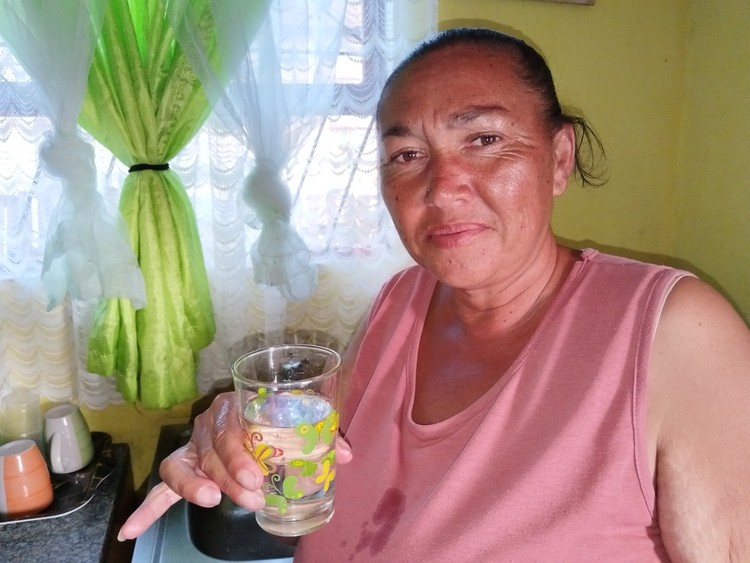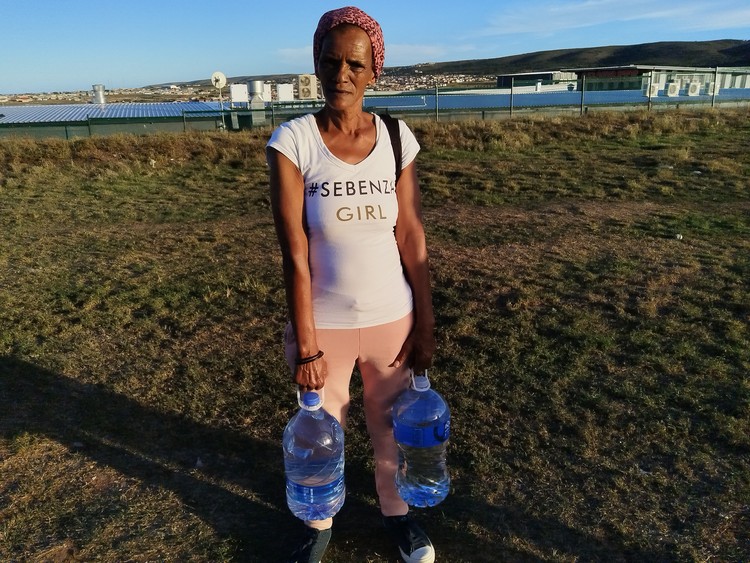Nelson Mandela Bay households have been told to boil tap water. But poor families say they can’t afford to
The combined dam level in the metro was below 12% on 7 March
Donna Whitehead from 7de Laan in Nelson Mandela Bay says her family still drinks water directly from the tap because they are unemployed and cannot afford to buy electricity to boil all the water they use. Photos: Mkhuseli Sizani
- Dam levels in Nelson Mandela Bay Municipality dropped below 12% this week.
- As a precautionary measure, the municipality has urged residents to boil the water before using it.
- But many poor households say they can’t afford to, as the price of electricity and paraffin continue to rise.
As dam levels continue to decline with the drought in Nelson Mandela Bay, the municipality has urged people to boil tap water before consuming it. But many families who depend on social grants say they can’t afford to do so, as the cost of electricity and paraffin are on the rise.
The municipality confirmed in a statement on 7 March that the combined dam level was below 12%. “Water supply system continues to be strained due to the ongoing drought caused by insignificant rainfall. The City encourages residents to reduce their water consumption…We will continue to supply water with tankers to areas with compromised water,” the statement read.
The City reported that as of 1 March the daily consumption was 272-million litres per day which is far over the daily target of 230-million litres.
Last week, Mayor Retief Odendaal urged people in the metro to first boil drinking water. Odendaal said the quality of the water could not be guaranteed because of borehole water in the reticulation system, coupled with low dam levels.
Odendaal said, “We are not saying there is bacteria in our water and therefore it is unsafe to drink. We are saying the water may not taste as it normally does and so as a precautionary measure our residents must just boil the water before consuming it.”
Donna Whitehead lives in 7de Laan in Gqeberha. She has had sporadic water outages for at least two years. “There are times when we go two or three days without water in our taps. Then we have to go to get water from standpipes at Vastrap informal settlement. On Wednesday water was only available in the morning,” she said.
Whitehead said it is too expensive to boil water for her and her five siblings, who survive on social grants.
“When we buy electricity, we get free units once every month. For example if we buy for R100 we get another R100 worth of units for free because we get assistance from the municipality. But this electricity doesn’t even last a month,” she said.
Felicity Malgas says she is scared to drink the tap water.
Whitehead said her family would continue drinking the tap water for as long as it does not make them sick.
Another resident, Ainsley Elias, said they queue for hours, especially over weekends, at communal taps in Vastrap. “The water tankers don’t come often. We struggle to do the washing. Sometimes water is out for a whole day or only runs at night and it doesn’t look clean,” she said.
Elias said she still drinks the tap water. “Boiling water is too expensive. A litre of paraffin is R15 and electricity is also expensive. I only boil water for my cup of tea. I save my electricity for cooking and to heat bath water,” she said.
Felicity Malgas said that she uses illegal connections for electricity but buys drinking water. “I’m scared of our tap water.”
Support independent journalism
Donate using Payfast

Don't miss out on the latest news
We respect your privacy, and promise we won't spam you.
Next: NEHAWU says strike action is growing
Previous: Six years to renovate a police station and it still isn’t finished
© 2023 GroundUp. This article is licensed under a Creative Commons Attribution-NoDerivatives 4.0 International License.
You may republish this article, so long as you credit the authors and GroundUp, and do not change the text. Please include a link back to the original article.
We put an invisible pixel in the article so that we can count traffic to republishers. All analytics tools are solely on our servers. We do not give our logs to any third party. Logs are deleted after two weeks. We do not use any IP address identifying information except to count regional traffic. We are solely interested in counting hits, not tracking users. If you republish, please do not delete the invisible pixel.


